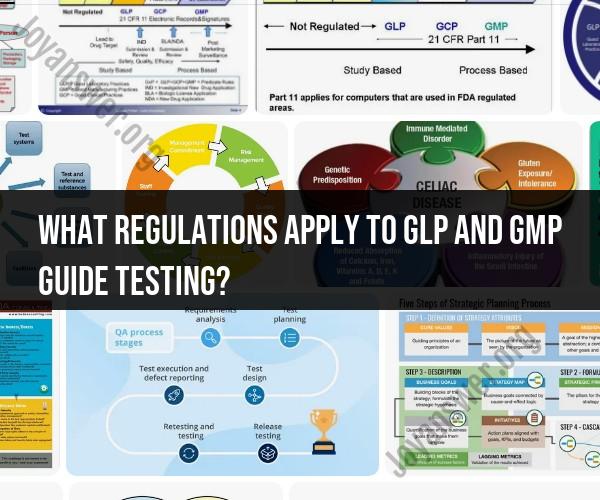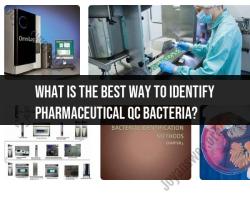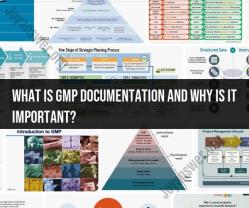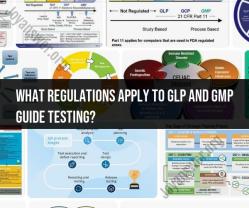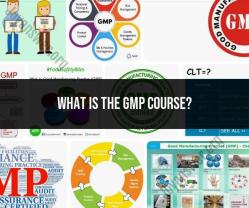What regulations apply to GLP and GMP Guide testing?
Good Laboratory Practices (GLP) and Good Manufacturing Practices (GMP) are regulatory guidelines and standards that apply to the testing and manufacturing of various products, particularly in industries like pharmaceuticals, biotechnology, medical devices, and food production. These guidelines aim to ensure the quality, safety, and integrity of products through well-defined processes and regulatory oversight. Here's an overview of the regulations that apply to GLP and GMP testing:
Good Laboratory Practices (GLP):
21 CFR Part 58 (FDA GLP Regulations): In the United States, the Food and Drug Administration (FDA) oversees GLP compliance for non-clinical laboratory studies conducted for the purpose of supporting research or marketing permits. These regulations are found in Title 21 of the Code of Federal Regulations (21 CFR) Part 58.
OECD GLP Principles: The Organisation for Economic Co-operation and Development (OECD) has established principles of GLP that are internationally recognized. Many countries and organizations adhere to these principles when conducting non-clinical safety studies.
ICH Guidelines: The International Council for Harmonisation of Technical Requirements for Pharmaceuticals for Human Use (ICH) has issued guidelines that incorporate GLP principles into drug development, ensuring data quality and integrity.
Other National Regulations: GLP regulations and guidelines vary by country. For example, the European Union has its own GLP regulations, and individual countries may have specific requirements as well.
Good Manufacturing Practices (GMP):
21 CFR Part 210 and 211 (FDA GMP Regulations): In the United States, FDA GMP regulations are found in Title 21 of the Code of Federal Regulations (21 CFR) Parts 210 and 211. These regulations cover the manufacturing, processing, packaging, labeling, and holding of pharmaceutical products.
EU GMP Guidelines: In the European Union, GMP is regulated by the European Medicines Agency (EMA) and the European Commission. EU GMP guidelines outline the standards for manufacturing, testing, and quality control of medicinal products.
ICH Q7 Guideline: The ICH Q7 guideline, titled "Good Manufacturing Practice Guide for Active Pharmaceutical Ingredients," provides internationally harmonized GMP standards for the production of active pharmaceutical ingredients (APIs).
ISO Standards: The International Organization for Standardization (ISO) has developed ISO 9001 (Quality Management) and ISO 13485 (Medical Devices - Quality Management Systems) standards, which incorporate GMP principles.
Other National Regulations: GMP regulations exist in various forms in countries around the world. Each country or region may have its own set of GMP regulations for pharmaceuticals, medical devices, cosmetics, and food products.
It's important to note that compliance with GLP and GMP is crucial for industries involved in research, development, testing, and manufacturing, as it ensures product safety, efficacy, and quality. Violations of these regulations can lead to regulatory actions, including product recalls, fines, or legal consequences. Organizations in these industries typically have dedicated compliance and quality assurance teams responsible for adhering to GLP and GMP guidelines and regulations relevant to their operations.
Navigating GLP and GMP Guide Testing Regulations
Good Laboratory Practices (GLP) and Good Manufacturing Practices (GMP) are two sets of regulations that govern the testing of products, such as food, pharmaceuticals, and medical devices. GLP regulations apply to nonclinical safety studies and efficacy studies, while GMP regulations apply to the manufacturing, processing, packaging, and labeling of products.
GLP and GMP guide testing regulations are designed to ensure the quality and reliability of testing data. By following these regulations, laboratories can help to ensure that their results are accurate and reproducible.
Compliance and Quality: Regulations Impacting GLP and GMP Guide Testing
GLP and GMP guide testing regulations are important for both compliance and quality. Compliance with these regulations is required by law in many countries. Additionally, following these regulations can help to improve the quality of products and reduce the risk of product recalls.
Ensuring Quality Assurance: GLP and GMP Guide Testing Requirements
GLP and GMP guide testing regulations cover a wide range of topics, including:
- Personnel training and hygiene: Laboratory personnel must be trained on GLP and GMP requirements. They must also follow proper hygiene practices to prevent contamination.
- Facility design and maintenance: Laboratory facilities must be designed and maintained in a way that minimizes contamination and ensures the integrity of test results.
- Equipment qualification and maintenance: Laboratory equipment must be qualified and maintained to ensure that it is operating properly.
- Materials handling and storage: Laboratory materials must be handled and stored in a way that prevents contamination.
- Production and process controls: Laboratory production and processes must be controlled to ensure the quality and reliability of test results.
- Quality control and testing: Laboratory quality control and testing procedures must be in place to ensure the accuracy and reproducibility of test results.
- Documentation and recordkeeping: Laboratory documentation and recordkeeping procedures must be in place to ensure the traceability and integrity of test data.
Tips for Navigating GLP and GMP Guide Testing Regulations
Here are some tips for navigating GLP and GMP guide testing regulations:
- Become familiar with the regulations. The first step is to become familiar with the GLP and GMP regulations that apply to your laboratory and the products you test. You can find this information on the websites of regulatory agencies such as the US Food and Drug Administration (FDA) and the European Medicines Agency (EMA).
- Develop and implement procedures. Once you are familiar with the regulations, you need to develop and implement procedures to ensure compliance. These procedures should cover all aspects of your laboratory operations, including personnel training, facility design and maintenance, equipment qualification and maintenance, materials handling and storage, production and process controls, quality control and testing, and documentation and recordkeeping.
- Conduct regular audits. It is important to conduct regular audits to ensure that your laboratory is complying with GLP and GMP regulations. You can conduct internal audits or hire an external auditor to conduct an audit for you.
By following these tips, you can navigate GLP and GMP guide testing regulations and ensure the quality and reliability of your test data.
